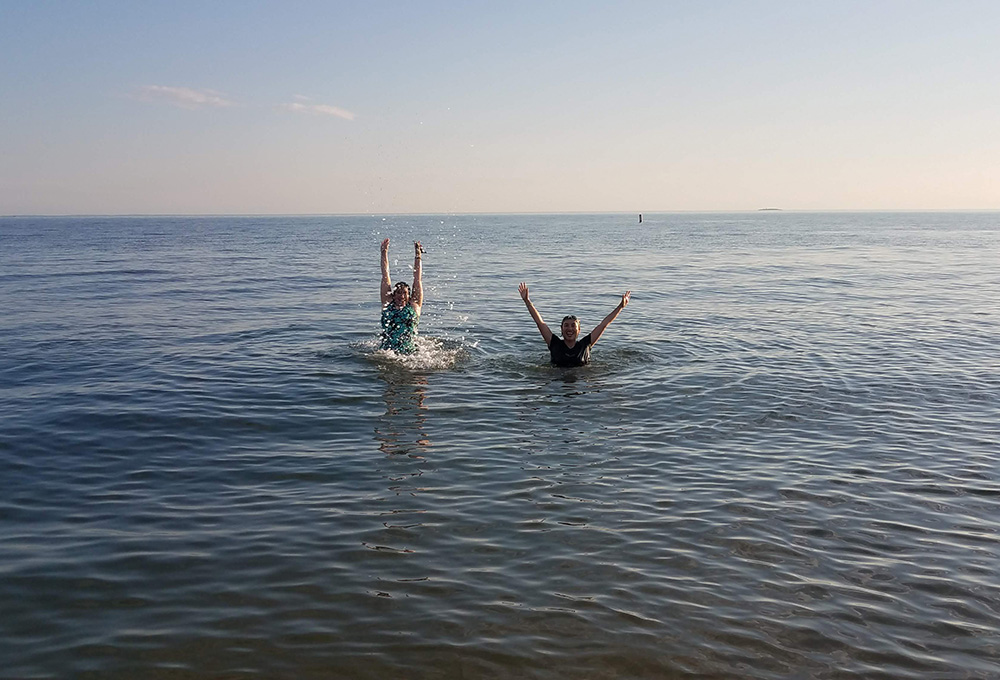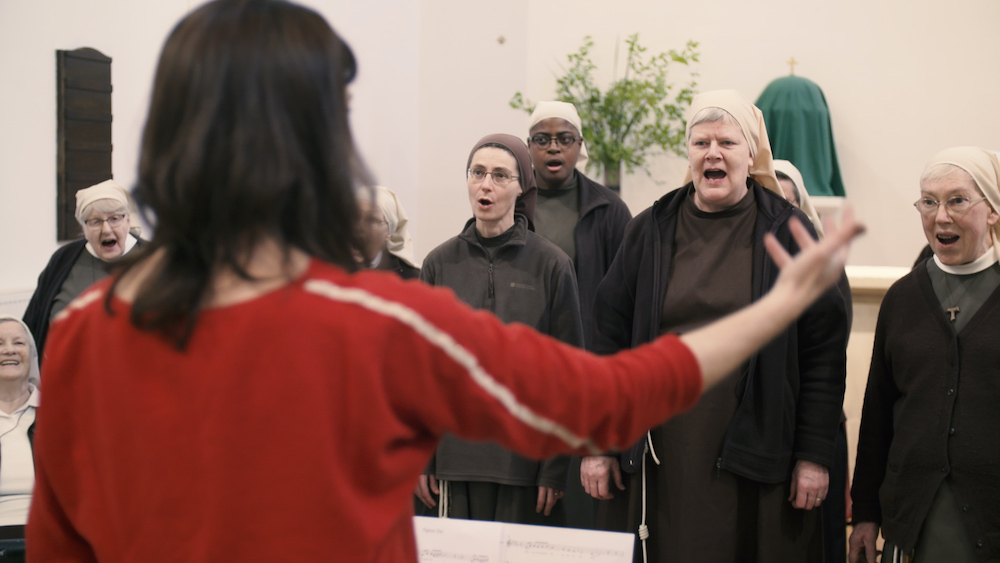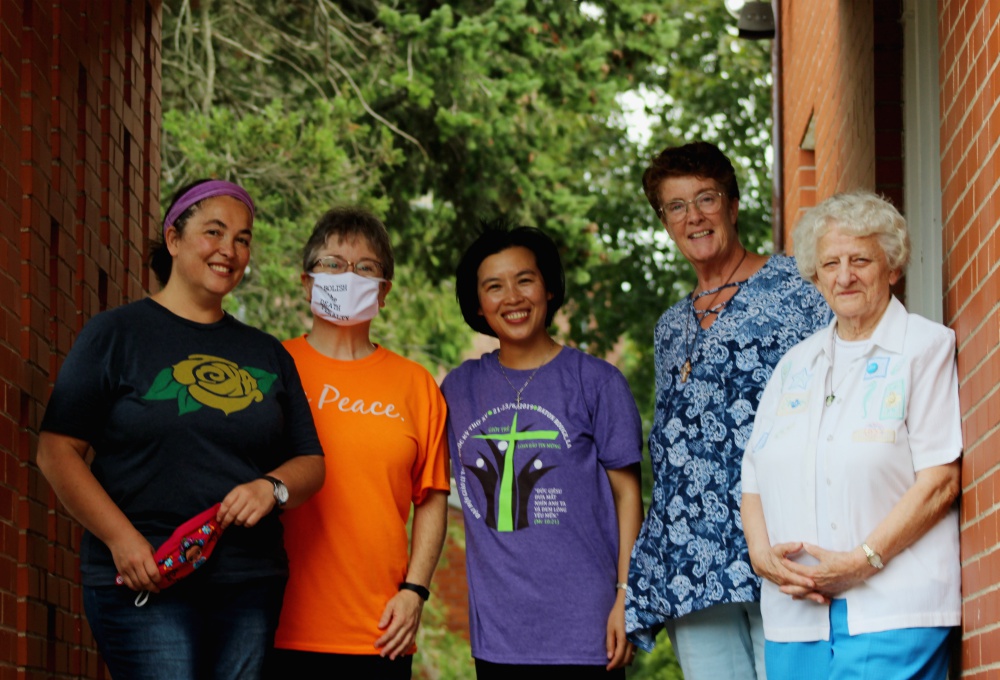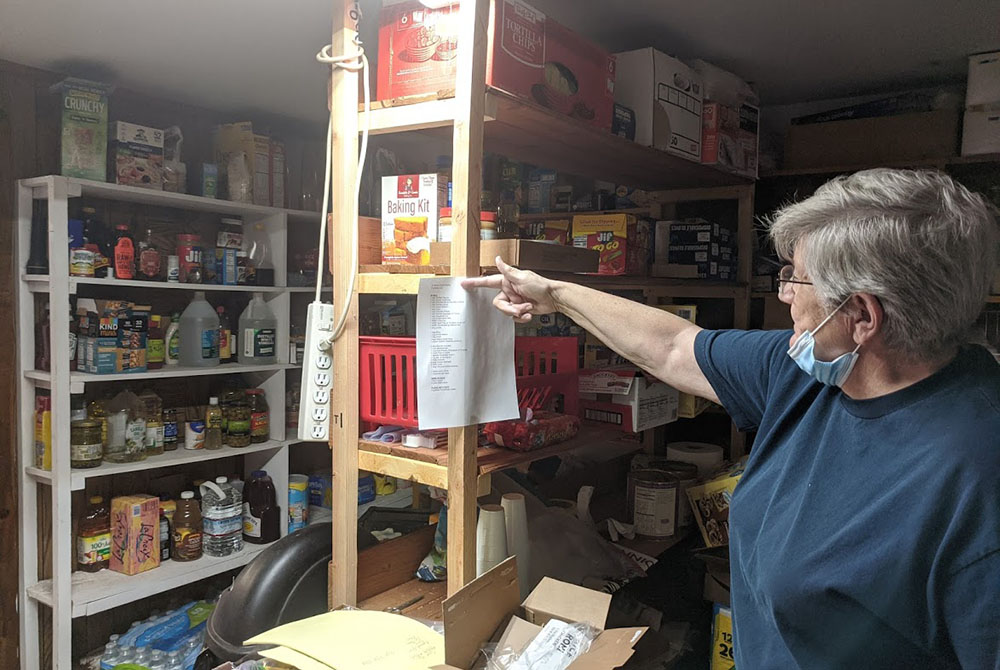
Dominican of Peace Sr. Ana Gonzalez, left, and Lovers of the Holy Cross Sr. AnHoa Nguyen enjoy the water of the Long Island Sound at Hammonasset Beach State Park in Madison, Connecticut, in summer 2020. (Provided photo)
We can all agree that 2020 was a tumultuous, often painful year, given the coronavirus pandemic, natural disasters like earthquakes, fires and hurricanes that affected many regions of the world, and election tensions, among other challenges.
I'm sure I join countless others looking forward to 2021, when we can hopefully hug our loved ones again. But before we say farewell to 2020, let's take a look back at the year on Global Sisters Report. I have compiled my annual list of 10 noteworthy stories (in no particular order) for you to revisit or to read for the first time.
We have some great ideas for 2021, and we are excited to make the journey with all of you. Blessings to you and all those you hold dear in the new year!

Local minister Sr. Mary Andrew Budinski looks at the memorial to remember the 12 sisters who died in one month from COVID-19 that sits in the gardens outside the Felician Sisters' convent in Livonia, Michigan. (GSR photo/Dan Stockman)
'Our most tragic time': Felician Sisters bear loss of 13 sisters to COVID-19 by Dan Stockman, published July 20
One of our biggest stories of 2020 was also one of our most tragic. In a matter of weeks, 30 Felician Sisters in Livonia, Michigan, were diagnosed with COVID-19, and 12 sisters died in one month.
"We couldn't contain the grief and the sorrow and the emotional impact," one sister said.
Because of restrictions, the sisters could not grieve in the usual way, and the losses had not yet settled in.
"The raw grief is yet to come, I think," the superior of the convent told Dan.
Our coverage of the pandemic this year included stories from sisters all over the globe. And while we hope that the vaccine will soon be available globally, GSR will continue to write about the lives the pandemic has affected.

Since Maribel Martínez's home was destroyed in the Jan. 7 earthquake, she's been living out of her car by a highway exit. (GSR photo / Soli Salgado)
Aftershocks and anxiety: Puerto Ricans distrust homes after devastating earthquake by Soli Salgado, published May 14
In January, a 6.4-magnitude earthquake rocked the southwest region of Puerto Rico, damaging more than 8,000 homes. Soli visited the island in February and found residents living in tents or cars while their homes were repaired. Most people she talked to had run out of their homes when the earthquake struck in the middle of the night and refused to go back inside.
"A lot of times, the house is safe — engineers have told them it's fine to keep living there — but still, people are too scared," one sister told Soli. "They'll sleep outside their homes in tents or their cars because they're afraid of what a tremble can do to their home while they're sleeping."
This story is just one part of our A Place to Call Home series, which ran from February through November and included stories on sisters ministering to those experiencing homelessness in eight countries in addition to Q&As and columns from sisters themselves. And don't miss our interactive map that charts where sisters are working to end homelessness around the world.
Novice's death in India puts spotlight on tragedies over three decades by Saji Thomas, published Sept. 24
I was astonished to hear of around 20 mysterious deaths involving novices and sisters serving in Catholic communities in Kerala state in southern India in the last 30 years.
Though the church has suggested many of the deaths are suicides attributed to depression, little has been done formally to address such a phenomenon within congregations.
Catholic groups earlier this year asked church authorities to take steps to dispel a growing mistrust in society regarding religious life and the deaths of the sisters.
"It is high time that the leadership of Conference of Religious India woke to this situation and put in place procedures and practical guidelines to prevent such deaths from taking place," a group of Catholic nuns and laywomen wrote to the religious major superiors in India in June.
Advertisement
Connection, compassion and care in a Bronx COVID-19 ward by Chris Herlinger, published June 18
Early in the pandemic, Sr. Mary Catherine Redmond, a Sister of the Presentation of the Blessed Virgin Mary who is chief physician assistant at North Central Bronx Hospital in the Norwood section of the Bronx in New York City, wrote a series of columns about life as a health care worker on the frontlines. We wanted to learn more about her and her work in the pandemic.
She met with Chris, also a resident of New York City, to discuss the trials and tribulations she and other health care workers faced in the first wave of the pandemic, which hit New York hard.
"There has been a lot of death in this population," she said. "That hurts so much."
She recalled driving home one day to the house she shares with four other Presentation Sisters and feeling overwhelming loss: "I remembered names of patients and families, conversations that weigh heavy on my heart. It was like a litany of saints in the car as I remembered each by name. There were so many."

The Poor Clares of Arundel sing during a recording session for their CD, "Light for the World." Husband-and-wife team Juliette Pochin, pictured facing away, and James Morgan co-wrote all the new music on the CD, which was recorded before the rise of the COVID-19 pandemic. (Morgan Pochin Music Productions)
Poor Clares' song reaches out in a hope to provide silence, calm by Sarah Mac Donald, published Oct. 19
The Poor Clares of Arundel in the United Kingdom usually live a quiet life of prayer, but when James Morgan and Juliette Pochin, a husband-and-wife duo that composes and produces music, called, the sisters jumped at the chance to provide young people with a way to find inner silence and calm in a noisy, pressurized world through music.
"It seemed we had this chance of reaching out to so many people we will never meet and might be moved in their deep selves by a touch of God," Sr. Aelred Casey told Sarah.
Their CD, "Light for the World," was released Oct. 16 by Decca Classics. And the Poor Clares of Arundel weren't the only community making music in 2020: Twelve Polish Carmelites in Iceland released an album with Icelandic composer and pianist Jónas Sen, a former keyboardist for Björk.

Sr. Mary Eucharista, a member of the Sisters of Mary, Mother of the Church, in the chapel of the Immaculate Heart Retreat Center where she works in Spokane, Washington. The Sisters of Mary, Mother of the Church is a public association of the faithful featured in the 2017 edition of "Emerging U.S. Communities of Consecrated Life since Vatican II." (GSR photo/Dan Stockman)
Emerging communities: Religious life is changing, but changing to what? by Dan Stockman, published March 16
In 2017, the Center for Applied Research in the Apostolate released its third directory of "Emerging U.S. Communities of Consecrated Life Since Vatican II." It was a wealth of information about what the future of religious life could look like.
The directory included a group of laywomen and laymen living a religious life designed by St. Francis for laypeople, large religious institutes similar to traditional congregations of women religious, and a pair of hermits living in the western foothills of the Rocky Mountains. In fact, it contained so much information, it took Dan more than a year to figure out the best way to write about the 159 active communities within the directory. The result was a four-part series called, appropriately, Emerging Communities.
"Very few groups [in the directory] are doing the traditional missions of education, health care or social service. And those were the cornerstones of religious life in the 20th century," Carol Coburn, a professor of religious studies and women's and gender studies at Avila University, told Dan. "But now, [as a woman] you don't have to go into religious life to do those things, and we have this broader view of social justice. But there's still that desire for spirituality."

(Unsplash/Aaron Burden)
'People are raw': Sisters reflect on how we live together post-election by GSR staff, published Nov. 2
The specter of the U.S. election hovered over the country for much of the year. But when we discussed how best to write about the election for GSR, we found ourselves talking more about the political divide in the country than who would win the election. Would it be possible for the country to come together again?
"We won't all be holding hands and singing 'Kumbaya,' no matter who wins. ... It's going to take more than the election for us to start talking about coming together," said Sr. Marcia Hall, vocation director of the Oblate Sisters of Providence.
One sister recommended finding humanity's roots in nature; another suggested dialogue and empathy.
"That inability to communicate is not only becoming more divisive, it's becoming violent," said Sr. Eileen McKenzie, president of the Franciscan Sisters of Perpetual Adoration, which hosted a series of gatherings called "Listening & Loving Through the Political Storm" in October and November. "So many people are pleading for some sense of dialogue, some sense of setting our own agenda aside and asking, what is the common good in all this?"

Sr. Rashmi Mattappally plays with a child while taking his weight at a local dispensary in Loiborsiret village in northern Tanzania. (GSR photo/Doreen Ajiambo)
Sisters encourage Masai mothers to turn to medically assisted deliveries by Doreen Ajiambo, published Jan. 13
In a remote, deeply traditional corner of northern Tanzania, Reginah Bennet, a member of the Masai tribe, told Doreen about the horrible ordeal she went through while giving birth to her fourth child with the aid of a traditional midwife versed only in folk medicine: "I felt my life draining out of me and I lost consciousness. I was certain I was going to die."
Tanzania is rated among the 20 countries with the highest maternal mortality rate, and among the Masai community there, the rate is higher than the national average. The sisters encourage pregnant women to deliver their babies in hospitals and even offer incentives to birth attendants to take the women to health facilities for prenatal care and childbirth assistance.
Bennet ended up at a hospital run by the Sisters of Notre Dame, who are fighting high maternal mortality in the region through improved quality of care.
"Doctors say it's a miracle I'm still alive," Bennet said. "I want to thank the sisters for saving my life."

Outside the back door of the New Haven Dominicans of Peace convent, from left, Srs. Ana Gonzalez, June Fitzgerald, Lovers of the Holy Cross Sr. AnHoa Nguyen (a visiting scholar from Vietnam), Dominican candidate Cathy Buchanan, and Sr. Julia Grey (Elizabeth Eisenstadt Evans)
'Quaran-team' at Dominican house embraces the beauty of community by Elizabeth Eisenstadt Evans, published Oct. 8
In New Haven, Connecticut, five sisters living at the House of Welcome — four Dominican Sisters of Peace and a Lover of the Holy Cross — reflect the diversity of vowed life in generation, ethnicity and temperament. They come from different backgrounds and are in different stages of their vocation, but they embrace those differences.
The group has spent a lot of time together since the pandemic began, which has allowed the multigenerational community to bond, playing cornhole and swimming in Long Island Sound.
"I love the fact that I'm able to live in an intercongregational community grounded in the love of God," one of the sisters told Elizabeth.

Dominican Sr. Monica Dubois ministers in the small town of Klagetoh, 55 miles south of Chinle, Arizona, with a population of about 200 people. She has provided emergency food and used clothing, and since the pandemic, now delivers drinking water, gives rides to homebound elderly to a grocery store, and talks to people on the phone. (Peter Tran)
Food banks, firewood and outreach: Sisters minister to the Navajo amid pandemic by Peter Tran, published Dec. 7
The Navajo Nation is a 27,000-square-mile area that covers parts of Utah, Arizona and New Mexico in the United States. Its 175,000 members have been hit hard by the pandemic: In May, it had the highest per capita coronavirus infection rate in the country.
Ministering to the members of the Indigenous tribe, especially during the pandemic, has required creativity, especially when not every member of the tribe has internet to stay in touch via Facebook or Zoom.
"We have done a lot of listening to the people," one sister told Peter. "That's one of the greatest things as far as I am concerned, because you really connect with people. I think we have made an impact on the community. They don't need advice, but they need someone who cares."
[Pam Hackenmiller is managing editor of Global Sisters Report. Her email address is [email protected].]






